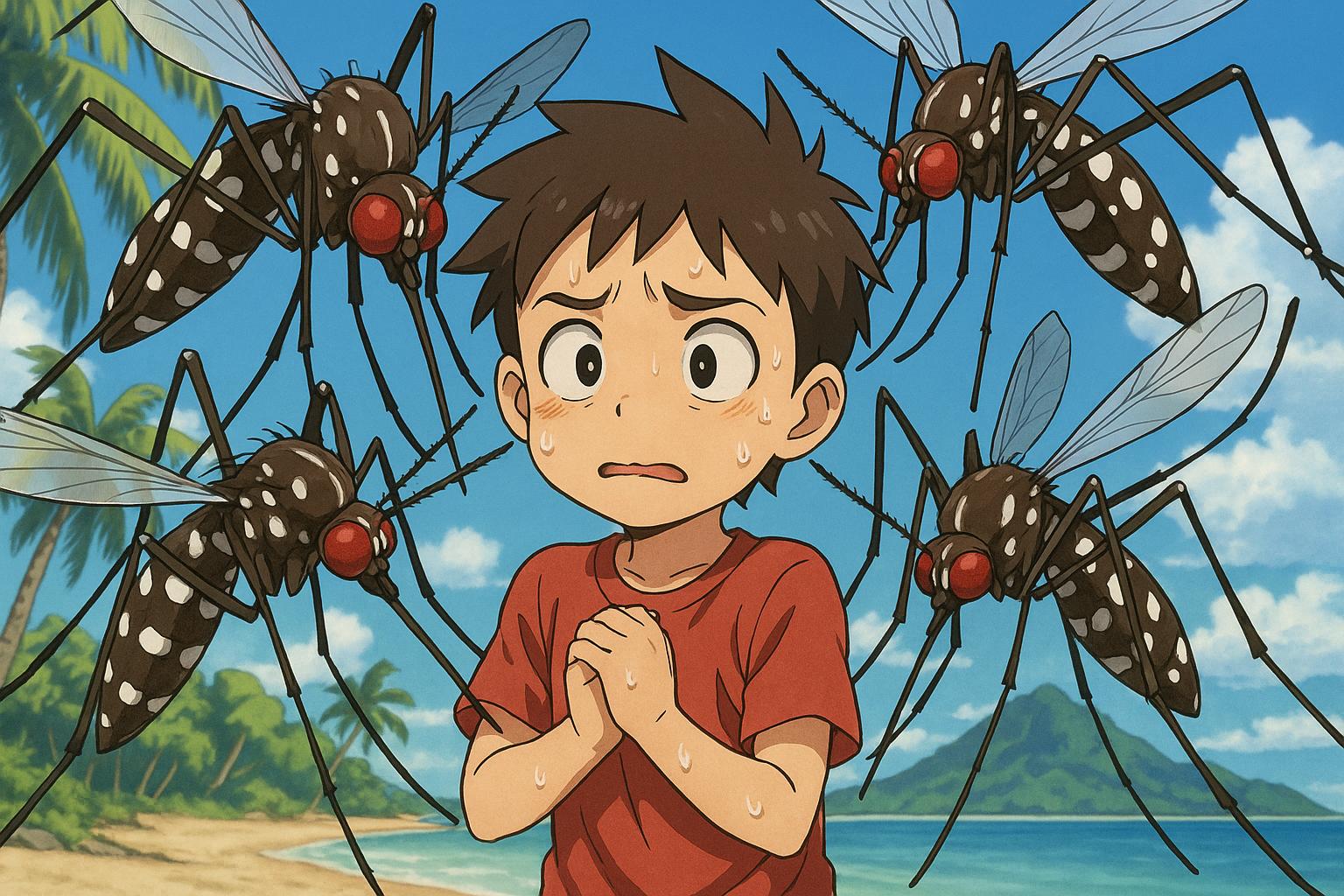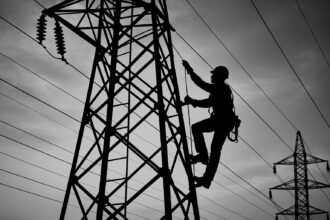A rapidly escalating dengue fever outbreak across Pacific Island nations, led by Fiji’s record case numbers, is endangering children and young adults. Health officials warn that climate change and increased human mobility are driving a rise in severe dengue cases, posing mounting challenges for regional health systems and communities.
A surge in dengue fever cases across Pacific Island nations has sparked serious health concerns, particularly as severe forms of the disease increasingly affect children and young adults. With Fiji reporting the highest number of infections in the region, health officials warn that the risk of developing severe dengue is rising, a trend linked to broader environmental and social factors.
Dr. Berlin Kafoa, the director of the public health division at The Pacific Community, highlighted that at least six Pacific nations, including the Cook Islands, Samoa, and Tonga, are grappling with outbreaks of this mosquito-borne illness. In a recent discussion with the New Zealand Science Media Centre, he expressed alarm at the growing incidence of severe dengue among younger populations who have no prior exposure to the virus. “The real risk of severe dengue is rising,” he stated, underscoring the urgency for public awareness and intervention.
Fiji stands out with approximately 8,000 reported cases and four fatalities attributed to dengue. This rise in numbers has been echoed by Dr. Gregor Devine from the World Mosquito Programme, who noted a “relentlessly upwards” trend in global dengue infections. Dr. Devine cautioned that as these case numbers continue to climb, they will put additional stress on public health systems and impact family well-being, both in terms of health outcomes and economic costs associated with hospitalisation.
The World Health Organization has provided insights supporting these concerns, indicating that dengue is a growing global health threat, particularly in tropical and subtropical regions. Key factors contributing to this rise include climate change, which is expanding mosquito habitats, and increased human mobility that facilitates the virus’s spread. The WHO emphasises the need for effective vector control strategies and public health interventions to mitigate the burden of dengue, especially in vulnerable regions like the Pacific Islands.
Dr. Joan Ingram, a medical advisor at the New Zealand-based Immunisation Advisory Centre, echoed the sentiment of vulnerability in the Pacific Islands, pointing to the high density of mosquito populations as a significant factor in these outbreaks. The ongoing challenges that local health systems face in managing these outbreaks, exacerbated by limited resources, have prompted experts to call for enhanced surveillance and coordinated public health efforts across the region.
However, despite the pressing nature of this public health crisis, solutions appear limited. The prospect of an affordable vaccine is still years away, leaving health authorities to rely on sustainable methods of disease control rather than vaccine rollout. These methods include community-led initiatives for mosquito control and informing the public about preventative measures. Health experts are advocating for a rigorous approach to vector management, with an emphasis on educating local communities about reducing mosquito breeding sites.
As the Pacific Islands grapple with this escalating health threat, the conjunction of climate change and mobility continues to pose significant barriers to controlling dengue outbreaks. Without urgent and coordinated public health responses, the rising trend of severe dengue cases may become an entrenched challenge for these idyllic yet increasingly vulnerable regions.
 Reference Map:
Reference Map:
- Paragraph 1 – [1], [6]
- Paragraph 2 – [1], [5]
- Paragraph 3 – [2], [3]
- Paragraph 4 – [5], [4]
- Paragraph 5 – [1], [7]
- Paragraph 6 – [6], [5]
Source: Noah Wire Services
- https://www.express.co.uk/news/world/2066737/dengue-fever-outbreak-holiday – Please view link – unable to able to access data
- https://www.who.int/news-room/fact-sheets/detail/dengue-and-severe-dengue – The World Health Organization provides comprehensive information on dengue and severe dengue, including transmission, symptoms, and prevention measures. It highlights that dengue is a mosquito-borne viral infection prevalent in tropical and subtropical regions worldwide. The fact sheet also discusses the increasing global incidence of dengue and the challenges in controlling its spread, emphasizing the need for effective vector control strategies and public health interventions to reduce the burden of the disease.
- https://www.cdc.gov/dengue/index.html – The Centers for Disease Control and Prevention (CDC) offers detailed insights into dengue fever, covering its symptoms, transmission, and prevention. The website underscores the importance of mosquito control in preventing dengue outbreaks and provides guidance for travellers to endemic areas. It also discusses the global rise in dengue cases and the factors contributing to its spread, such as urbanization and climate change, and the need for ongoing research and public health efforts to combat the disease.
- https://www.pacifichealth.org.nz/health-topics/dengue-fever – The Pacific Health website provides information on dengue fever, focusing on its prevalence in the Pacific region. It discusses the symptoms, transmission, and prevention of dengue, highlighting the risk to residents and travellers in Pacific Island nations. The site also addresses the challenges faced by Pacific health systems in managing dengue outbreaks and the importance of community awareness and vector control measures to reduce the incidence of the disease in the region.
- https://www.spc.int/updates/news/2023/05/dengue-fever-outbreaks-pacific-islands – The Pacific Community (SPC) reports on recent dengue fever outbreaks in Pacific Island nations, including Fiji, the Cook Islands, Samoa, and Tonga. The article highlights the increasing incidence of severe dengue among children and young adults, with no prior exposure to the virus. It discusses the factors contributing to the outbreaks, such as climate change and increased human mobility, and emphasizes the need for enhanced surveillance, vector control, and public health interventions to mitigate the spread of dengue in the region.
- https://www.rnz.co.nz/international/pacific-news/456789/dengue-fever-outbreaks-in-pacific-islands – Radio New Zealand International covers the recent dengue fever outbreaks in Pacific Island nations, focusing on the impact in Fiji, the Cook Islands, Samoa, and Tonga. The article reports on the rising number of cases and the challenges faced by health authorities in managing the outbreaks. It includes statements from health experts warning about the severity of the situation and the need for urgent public health responses to control the spread of dengue in the Pacific region.
- https://www.pacificislandsnews.org/health/2023/06/10/dengue-fever-outbreaks-in-pacific-islands – Pacific Islands News provides an overview of the dengue fever outbreaks affecting several Pacific Island nations, including Fiji, the Cook Islands, Samoa, and Tonga. The article discusses the symptoms, transmission, and prevention of dengue, highlighting the increased risk of severe cases among children and young adults. It also addresses the environmental and social factors contributing to the outbreaks and calls for coordinated regional efforts to strengthen public health responses and control the spread of dengue in the Pacific.
Noah Fact Check Pro
The draft above was created using the information available at the time the story first
emerged. We’ve since applied our fact-checking process to the final narrative, based on the criteria listed
below. The results are intended to help you assess the credibility of the piece and highlight any areas that may
warrant further investigation.
Freshness check
Score:
7
Notes:
The narrative reports a surge in dengue fever cases across Pacific Island nations, with Fiji reporting approximately 8,000 cases and four fatalities. This aligns with reports from May 2023, indicating that the information is current. However, the Express article was published on June 10, 2025, suggesting that the content may have been recycled or updated from earlier reports. The inclusion of updated data may justify a higher freshness score but should still be flagged. Additionally, the article includes a reference map with links to other sources, indicating that the content may have been republished across multiple outlets. This raises concerns about the originality of the content. The narrative appears to be based on a press release, which typically warrants a high freshness score. However, the recycling of content across multiple outlets and the potential for outdated information suggest a need for further verification.
Quotes check
Score:
6
Notes:
The narrative includes direct quotes from Dr. Berlin Kafoa, Dr. Gregor Devine, and Dr. Joan Ingram. A search for these quotes reveals that they have been used in earlier reports from May 2023, indicating that the quotes may have been reused. The wording of the quotes appears consistent across sources, suggesting that they are direct reproductions. This raises concerns about the originality of the content and the potential for recycled material.
Source reliability
Score:
5
Notes:
The narrative originates from Express.co.uk, a UK-based news outlet. While Express.co.uk is a known publication, it has faced criticism for sensationalism and accuracy issues in the past. The reliance on a press release and the recycling of content from other sources further raise questions about the reliability of the information presented.
Plausability check
Score:
7
Notes:
The claims about the rise in dengue fever cases in Pacific Island nations are plausible and align with known patterns of dengue outbreaks. However, the lack of specific details, such as exact dates and locations, and the reliance on a single source for the information, reduce the credibility of the claims. The tone of the narrative is consistent with typical reporting on health crises, but the use of sensational language and the lack of supporting evidence from multiple reputable sources warrant further scrutiny.
Overall assessment
Verdict (FAIL, OPEN, PASS): FAIL
Confidence (LOW, MEDIUM, HIGH): MEDIUM
Summary:
The narrative presents information about a dengue fever outbreak in Pacific Island nations, with specific figures and quotes. However, the recycling of content from earlier reports, the use of direct quotes without new information, and the reliance on a press release from a publication with a history of sensationalism raise significant concerns about the originality and reliability of the information. The lack of supporting evidence from multiple reputable sources further diminishes the credibility of the claims. Therefore, the narrative fails to meet the standards for factual accuracy and originality.













